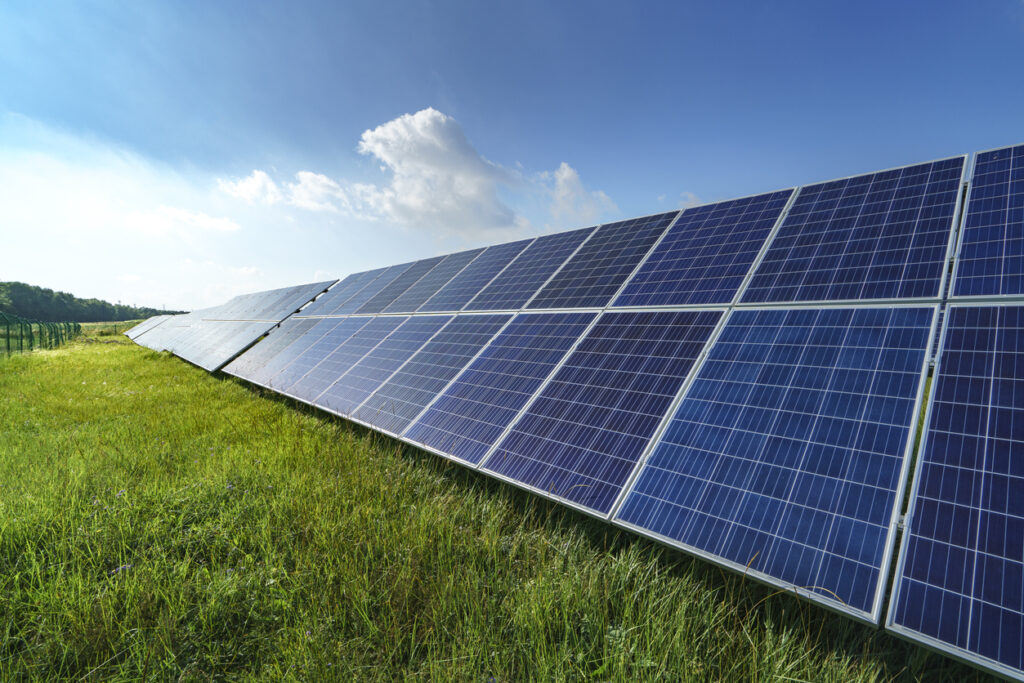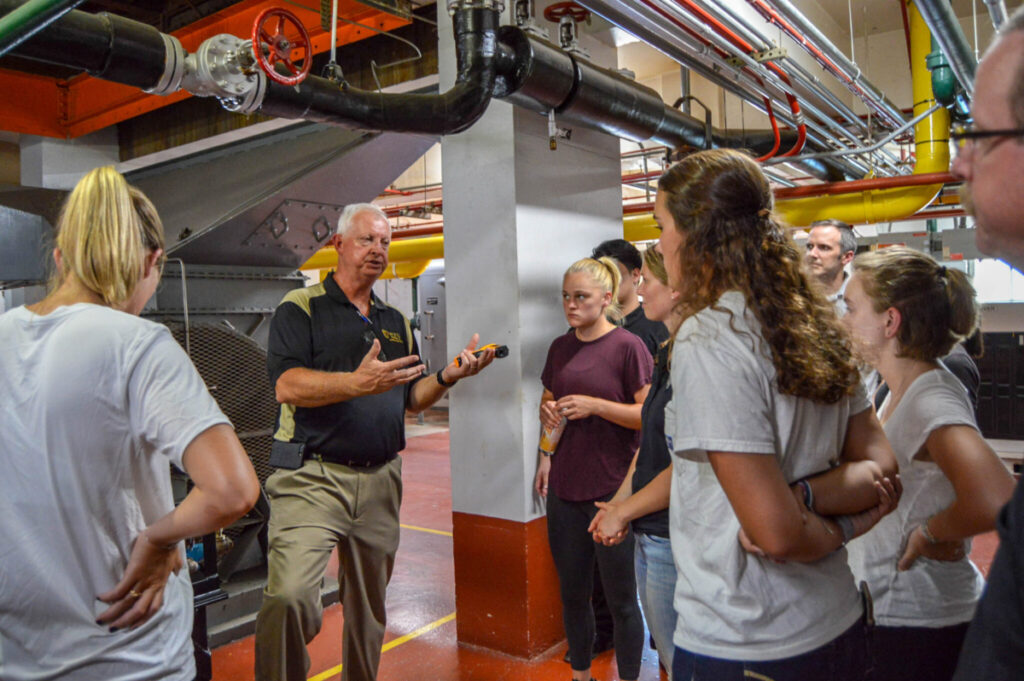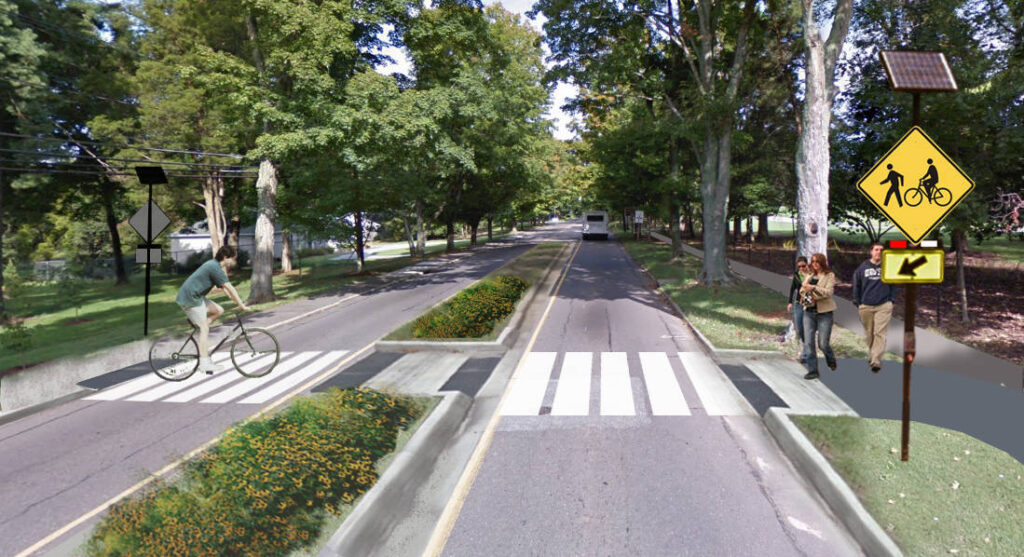2020 Sustainability Strategic Plan
Outlined in the 2020 Sustainability Strategic Plan are two overarching goals, supported by measurable objectives and tactics, that have propelled us forward in our sustainability endeavors at Wake Forest in the years following.
Goal #1
Develop a comprehensive action plan to achieve climate neutrality by 2040.
Goal #2
Create cross-curricular opportunities that introduce at least half of all students to disciplinary-specific sustainability content.
Climate Action
The university’s 2024 Climate Action Plan Update outlines the university’s three-phased climate action plan, progress to date, and priorities for the future. Visit this page to access the CAP Update and learn more.
Education for Sustainability
Our Campus Engaged Learning program and annual Magnolias Curriculum Workshop underpin our commitment to education for sustainability across the disciplines. Learn more about the engaged and experiential learning opportunities we facilitate.
2012 Sustainability Strategic Plan
The following five sections outline the goals and outcomes of the university’s first Sustainability Strategic Plan, released in 2012. These goals were generated collaboratively by stakeholders across campus and garnered the support of the offices responsible for leading the implementation. Though several tactical implementation targets were identified in conjunction with each goal, members of the Wake Forest community were encouraged to develop creative solutions to meeting the goals within their areas of influence.
The time period for implementing these goals was academic year 2012/13 to academic year 2014/15. The outcomes listed beneath each goal were generated in 2019 to evaluate progress and reiterate our commitments in the lead up to the second sustainability strategic planning process.
Built Environment, Energy & Water:
These initial 2012 goals established a starting point for efficiency in the built environment that Facilities and Campus Services has since far surpassed. Efficiency investments likes retrofits to lighting, upgrades to on-site utility generation, and the addition of solar thermal heating for domestic hot water are all part of an efficiency gain trajectory that resulted in energy savings and related greenhouse gas reductions of nearly 30% by the end of 2019.
Outcome: Wake Forest now has 12 buildings that are LEED-certified, including two LEED-Platinum renovations downtown, 5 LEED-Gold, and 5 LEED-Silver. New construction and major renovations are designed to achieve a minimum of LEED-Silver certification.
Outcome: Preserving and retrofitting buildings — like Reynolds Gymnasium and Salem Hall — saves between 50-75% of the embodied materials, energy, and equivalent carbon. Through renovation and retrofitting, the six residence halls on Hearn Plaza now use 24% less energy and 42% less water. Low-flow shower heads, faucets, and toilets and LED lights all contribute to these efficiency gains.
While the addition of signature buildings like Farrell Hall, the Shah Basketball Complex, and the Sutton Sports Performance Center has resulted in over 800,000 square feet of new building space, a total of 52 renovation projects of over 600,000 square feet optimized existing buildings for new needs.
Outcome: Wake Forest has designed, built, and renovated buildings that are adaptable and responsive to occupant behaviors. Facilities & Campus Services uses advanced building scheduling technology to conduct routine automatic shutdown and startups to save energy when buildings are not in use. Our annual temperature setback over the winter holiday, for example, has saved over $460,000 in projected energy costs since 2010. Addition of building automation technologies like occupancy sensors for lighting and remotely controlled thermostats also reduce energy usage intensity.
Outcome: Maximum building efficiency can only be achieved if occupants do their part. Promoting behavior change through outreach events, building information sessions, and competitions between residence halls empowers occupants to maximize efficiency efforts.
Outcome: In 2017, NC House Bill 589 created new opportunities for renewables including limited commercial leasing options. We have identified eligible roof space on campus for the 1 MW of rooftop solar that the new program would support. If we are able to identify a qualified commercial lessor through North Carolina’s new program, design and construction would take about two years.
Outcome: In addition to the 110,000 gallon stormwater cisterns and bioswales installed behind the Byrum Welcome Center in 2011, two 50,000 gallon cisterns were installed beneath the McCreary Field House practice football field in 2016. This stormwater will supplement 20-40% of the municipal water used by the South Chiller Plant.
The university has also invested in a variety of stormwater systems that slow the movement of water across the landscape and improve its quality. Examples include bioswales beneath Jasper Memory Lane and South Residence Hall (2010), the Winston Hall rain garden (2012), and permeable brick walkways surrounding Farrell, Dogwood and Magnolia Halls (2014).
2019 Update
Though our campus footprint has grown by 44% since 2007 to over 5.2 million gross square feet of built space, our energy intensity per square foot continues to steadily decline. With a 47% reduction in total carbon equivalents from operations since 2007, Wake Forest is on track with the Paris Climate Accord to achieve a 50% reduction by 2030.
Dining & Food Systems
Complementing Wake Forest’s commitment to culinary excellence, the Eat with Purpose campaign is a hallmark of Deacon Dining. This framework promotes fueling one’s body with the macro and micro nutrients it needs to perform– placing an emphasis on an abundance of nutrient-rich fruits, vegetables, and plant proteins.
We started with great-tasting, high quality foods, moved into Eating with Purpose, and transitioned easily to serving less meat that is of a higher quality. A win-win-win. Our plant-forward dining committee has brought passionate students together to educate their peers on the benefits of a plant-forward diet.
Outcome: Wake Forest dining increased the amount of food purchased from third-party verified (TPV) sustainable sources from 3% in 2015 to more than 30% in 2018. The sourcing transition began with animal proteins and continues into produce and grains. Accountability for Deacon Dining’s expressed commitment to responsible sourcing is ensured through a multi-stakeholder Sustainability-in-Dining working group that meets biweekly.
Outcome: In the earlier years of working toward this goal, dining partners distributed a regular e-newsletter communicating various commitments to sustainability in operations. With a growing following across social media platforms, the enhanced commitment to plant-forward dining, sustainable sourcing, and innovative menu planning has been showcased on Deacon Dining’s main channels as well as special student-focused channels with a focus on sustainability.
Outcome: Through a series of lunch-and-learn opportunities, sustainability and catering leadership met with departments to educate them about the benefits of plant-forward and low-waste catering options. We focused on areas of campus operations with a high catering footprint, as well as areas that had not traditionally ordered through campus catering – those accustomed to spending university funds with off-campus providers like fast casual sandwich shops. These ongoing opportunities to learn through tasting have shifted demand for these options in a positive direction.
Teaching & Research
Outcome: Since 2012, over 90 faculty members across disciplines have developed sustainability-related and focused courses through our Magnolias Curriculum Project. This annual, two day workshop has helped embed discipline-specific sustainability themes across the curriculum. As a result, 29 out of 32 departments and schools across campus now offer courses with sustainability outcomes.
The Engaged and Experiential Learning program provides faculty the opportunity to incorporate sustainability into their courses through engaged learning. This connective program supports collaborative efforts between operational and academic department members to engage students in analyzing, evaluating, and generating creative solutions for a more sustainable campus.
Outcome: Wake Forest offers courses of study in sustainability through the undergraduate Environmental Program (Est. 1995) and the Sustainability Graduate Programs (Est. 2015). As of January, 2020 Wake Forest has approved two new undergraduate majors: a B.A. in environment and sustainability and a B.A. in environmental science. In the past 25 years, over 200 undergraduates have graduated with a minor in environmental studies or environmental science. At the graduate level, the Sustainability Graduate Programs have shaped over 80 professionals to lead the sustainability transformation in a diverse mix of public and private sector careers. The program is unique in offering two dual degree programs in addition to an MA in Sustainability — an MDIV/MA in Sustainability and a JD/MA in Sustainability.
Outcome: Though the university has not made permanent faculty appointments in the earth sciences to date, the Office of the Dean of the College created a Postdoctoral Fellowship in this area. 30 academic departments and programs hired new faculty members since 2012. 50% of those departments hired at least one faculty member who offers sustainability content; 35% of departments hired faculty who have made significant contributions to the ongoing development of the sustainability curriculum.
Outcome: Addressing the world’s greatest sustainability challenges requires perspectives and approaches from multiple disciplines. Centers, like the Center for Energy, Environment, and Sustainability support interdisciplinary research and problem-solving. Similarly, interdisciplinary programs, like the Environmental Program and the Interdisciplinary Humanities Program, create more formalized institutional opportunities for faculty from multiple disciplines to come together to develop cross and interdisciplinary courses of study and to hire faculty whose work is interdisciplinary by nature.
Interdisciplinary teaching is important to the institution and not more important than single-disciplinary teaching. Pilot funding, in the form of course development grants, for faculty working in interdisciplinary teams did not sufficiently incentivize additional interdisciplinary team teaching beyond work that was already underway and did not trump institutional commitments to single-discipline courses that satisfy divisional requirements, for example.
Outcome: Sustainability-centered and community-facing programs like the Food, Faith and Ecological Well-Being Program and the Environmental Law and Policy Clinic have embodied the spirit of Pro Humanitate at Wake Forest. The intersections of environmental stewardship, ecological well-being and food justice are explored through the Wake Forest School of Divinity’s Food, Health and Ecological Well-Being Program. Program Director Fred Bahnson’s research and teaching focus on the nexus of ecology, sustainable agriculture, and contemplative spirituality. The newly-established Environmental Law and Policy Clinic gives those otherwise unable to afford or access environmental representation by providing a champion for their cause, simultaneously allowing students to hone skills that cut across economics, social issues, scientific uncertainty, and environmental imperatives.
Transportation
Outcome: The university moved from a two to three-year residency requirement for undergraduate students in fall 2013. This significantly reduced the number of students commuting to campus from off-campus residences. Overall, the number of on-campus and commuter student parking permits decreased by nearly 38% from 2012 to 2020. Since 2012, the number of parking permits sold to first-year students has consistently decreased by a small margin each year.
The Wake Line shuttle service was established in fall 2009 with a few routes that served nearby apartment complexes. It now offers nine shuttle lines that also connect students with the broader Winston-Salem community, including Wake Downtown, Hanes Mall, the UCC, and multiple locations in the heart of downtown. In just the last year, shuttle ridership is up by 23% to 17,000 passengers annually
Outcome: Wake Forest encourages faculty and staff to share the ride to and from work by incentivizing carpooling. Prior to 2014, there was only one registered faculty/staff carpool permit. There are now 32 active permits across campus.
A small number of faculty and staff commute on foot and by bicycle. A 2014 Bicycle, Pedestrian, and Transit Study of the area around campus provided recommendations for the most important improvements that need to be made to create safer and more convenient bicycle and pedestrian access to and from campus. Several of the recommendations, including improvements on Polo Road and a safer crossing at the Reynolda historic district, are underway.
Overall, we reached a 9% reduction in the percentage of faculty and staff who purchased individual parking permits — a decrease from 91% in 2012 to 82% in 2020.
Outcome: Since 2015, five electric vehicle charging stations have been installed at Wake Forest including on the Reynolda campus core, at Graylyn, and at the University Corporate Center (UCC). Since the installation of these stations, the number of unique users has grown from just seven in 2015 to 157 in 2019.
Outcome: Efficiency is not formally mandated by policy, and in practice, the fleet has gradually evolved to include EV, hybrid, and fuel efficient models as older vehicles are retired. The Facilities & Campus Services (F&CS) fleet currently has 78 all-electric vehicles, including trucks, vans, and golf carts. F&CS also has three hybrid vehicles.
20% of the Transportation & Parking Services (TaPS) vehicle fleet is currently made up of electric vehicles. TaPS has also worked diligently to right size campus vehicles to support ridership needs. This ensures, for instance, that smaller, more efficient shuttles are used for essential service routes that have consistently lower ridership, which decreases emissions from those vehicles. TaPS accomplishes this through tracking passenger ridership and the fuel efficiency of the fleet vehicles.
Outcome: A Bicycle, Pedestrian, and Transit Study for the Wake Forest University area in Winston-Salem was conducted in 2014 by the Winston-Salem Department of Transportation (WSDOT) and the City-County Planning Board (CCPB) of Forsyth County and Winston-Salem, in cooperation with Wake Forest University (WFU). This project aimed to improve active transportation and transit choices between the WFU campus and surrounding neighborhoods through infrastructure and policy improvements.
Additionally, an on-campus Bicycle and Pedestrian Infrastructure study, was conducted in 2015. This study differed from the 2014 in its focus on campus infrastructure. The study identified current opportunities and constraints for walking and bicycling on the Reynolda Campus and provided a prioritized set of recommendations for improvement.
As a complementary offering, our Re-Cycle bike share program offers students, faculty, and staff the chance to borrow a bike for the semester. Based on demand, the program has grown from an original fleet of 35 bicycles in 2015 to 150 in 2019.
Waste Reduction & Recycling
Outcome: Waste, including landfill and recycling, increased by 4%, from 563 lbs per person** in 2012 to 588 lbs per person in 2019. While waste diversion strategies like recycling, composting, and repurposing are important to our goal of reducing landfill waste, they represent unsustainable resource use and should be considered last-choice options following all waste reduction strategies.
*The original goal did not exclude yard waste or surplus. We have excluded them from this calculation since the majority of the weight of yard waste is composed of fallen trees in storms and surplus weights are highly variable according to major renovations. Neither necessarily reflect institutional waste reduction practices.
**Waste per person is a calculation of weighted campus users, a measurement of an institution’s population that is adjusted to accommodate how intensively certain community members use the campus. This measurement is required by the Association for the Advancement of Sustainability in Higher Education (AASHE) for the Sustainability Tracking Assessment & Rating System (STARS) reporting.
Outcome: Though the Wake Forest University procurement policy does not outline specific guidelines for sustainable procurement practices, the university has adopted de facto purchasing and performance standards that encourage waste reduction. For example, furniture delivered by manufacturers is wrapped in reusable blankets rather than disposable plastic wrap. The university also leases Xerox machines and repairs them on-site on an as-needed basis. This purchasing standard significantly reduces the number of machines being thrown away and bought new.
Additional performance standards include design guidelines like carpet tiles rather than wall-to-wall carpet. This ensures that individual squares can be replaced as needed rather than pulling up and disposing of large sheets of good rooms full of carpet. Residence Life and Housing also equips each on-campus housing room or unit with an EnergyStar rated combo micro/fridge appliance.
Outcome: The standard operating procedure for waste and recycling collection on campus is primarily communicated through the Office of Sustainability’s “Put Waste In Its Place” campaign. Since the Wake Forest recycling collection program began in 1990, there have been a number of milestones in developing and communicating a standard operating procedure for waste and recycling collection on campus, with multiple upgrades leading to the current standardized color-coded collection infrastructure.
Outcome: Two pre- and post-consumer food waste audits in the primary dining hall in the fall of 2011 led the university to contract with Gallins Family Farms, a local industrial composting facility, to collect organic waste at Wake Forest. Since this goal was set, Wake Forest designed and built North Dining Hall as a completely zero-landfill facility, launched the Compost Crew, and created the office organics collection program. The next phase of implementation will be an organics collection program in apartment-style residence halls.
To download a pdf of the university’s first sustainability strategic plan, click here.
Related Posts
- The Growing Role of Renewable Energy
 Perspectives on Sustainability, Quarterly Newsletter As we publish, world leaders and climate reporters are gathered in Dubai for the 28th United Nations Climate Conference, COP28. […]
Perspectives on Sustainability, Quarterly Newsletter As we publish, world leaders and climate reporters are gathered in Dubai for the 28th United Nations Climate Conference, COP28. […] - Wake Forest Alumna and Former Office of Sustainability Intern Becomes AASHE Finalist
 Quin Wolters (’23) returned to her alma mater this fall as Harvest Table Culinary Group’s inaugural Sustainability Coordinator By: Jimena Elmufdi (’24) for the Old […]
Quin Wolters (’23) returned to her alma mater this fall as Harvest Table Culinary Group’s inaugural Sustainability Coordinator By: Jimena Elmufdi (’24) for the Old […] - We Are Still In: University Commitment to GHG Reduction Grows Despite National Withdrawal from Paris Agreement
 By Sophia Masciarelli (’22), Content Development Assistant In 2015, the Paris Agreement was adopted and signed by 195 nations around the world as part of […]
By Sophia Masciarelli (’22), Content Development Assistant In 2015, the Paris Agreement was adopted and signed by 195 nations around the world as part of […] - Pedestrian Safety Improvements Under Way Across Reynolda Road
 Pedestrians will soon have a safe path to cross Reynolda Road near the entrances to Reynolda House Museum of American Art and Graylyn Estate. Construction […]
Pedestrians will soon have a safe path to cross Reynolda Road near the entrances to Reynolda House Museum of American Art and Graylyn Estate. Construction […] - Wake Forest Athletics’ Commitment to Climate Action
 Wake Forest Director of Athletics John Currie is one of four collegiate Athletic Directors from Power Five conferences that will showcase their […]
Wake Forest Director of Athletics John Currie is one of four collegiate Athletic Directors from Power Five conferences that will showcase their […] - The Road to Reducing Climate Impact Starts Here
 All climate actions plans, from universities to transnational corporations, start in the same place: building and plant efficiency. Wake Forest’s investments in energy efficiency started, […]
All climate actions plans, from universities to transnational corporations, start in the same place: building and plant efficiency. Wake Forest’s investments in energy efficiency started, […]
